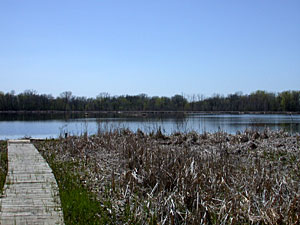|
Photos
More from MPR
Resources
|
 |
| The shore of this lake shows a healthy wetland. (Photo courtesy of the Minnesota Center for Environmental Advocacy) |
St. Paul, Minn. — The MCEA report grew out of last year's Duck, Wetlands and Clean Water Rally that attracted some 5,000 hunters, anglers and environmentalists to the state Capitol.
The group's legal director, Janette Brimmer, says her staff heard countless stories from rally participants who were concerned about wetlands that they had seen damaged or destroyed in recent years.
Brimmer says her organization began checking out some of those stories. It discovered that more than 3,000 acres of wetlands have been destroyed, due to exemptions and inadequate enforcement of Minnesota's Wetland Conservation Act.
"We still have net wetland losses being reported which is a real core issue, since we were hoping to -- all the way back 15 years ago when the Wetland Conservation Act passed -- have net gains," says Brimmer.
Brimmer says her organization doesn't have a grasp yet on the full extent of the losses. She says that's because state and federal agencies usually don't require reporting of small-scale wetlands destruction.
"We need to know better. We need to inventory, monitor, report better what is going on with wetlands," she says.
Brimmer says MCEA intends its report to serve as an early warning that the state may have a big wetlands problem. Wetlands provide important habitat for waterfowl, and they filter and store excess water.
But Ron Harnack, a member of the Board of Water and Soil Resources, says he believes the report lacks the proper context.
"The report tends to suggest that this is a very, very significant loss of quantity and quality of wetlands in the state, and I think that is subject to some significant debate," says Harnack.
Harnack doesn't dispute the MCEA's findings, since some of the data is based on numbers collected from his organization. But he says while he agrees that wetland losses are worth studying, he says it's not clear the losses are problematic.
"The vast majority of all these little incremental increases, probably better than 80 percent, are less than a half acre in size," Harnack says.
Harnack says the Board of Water and Soil Resources will convene a group of stakeholders in the coming weeks to study wetlands exemptions, figure out whether the wetlands losses are significant, and if there are reasonable ways to reduce the losses.
The Department of Natural Resources will be one of the groups involved in that project. Wetlands program coordinator Ron Norris says the DNR is also planning to conduct its own monitoring of wetlands to identify losses and gains. The department will take aerial photographs of several thousand randomly located plots, and then compare those pictures from year to year.
"And by doing that in a statistically sound way, we can make some objective determinations about what's really happening in terms of gains and losses of wetlands statewide," says Norris.
But Norris says the MCEA report is valuable because it does provide a good first look at some of the state's wetlands problems. And he predicts it will spark a lot of debate at this weekend's Wetlands Summit in Bloomington, where policy recommendations will be set for the upcoming legislative session.
Many of the people who will attend the summit are especially concerned about habitat losses in Minnesota's Prairie Pothole region, which includes parts of southern and western Minnesota. More than 90 percent of those wetlands have been drained, and Norris says many hunters are convinced that's why ducks numbers have declined so dramatically in recent years.
"We've gotten to the point where we've gotta begin asking the question, when do we stop losing wetlands down there?" says Norris.
In addition to better wetlands monitoring, the Minnesota Center for Environmental Advocacy report calls on state officials to tighten up wetlands exemptions, and dedicate more resources to wetlands enforcement.




